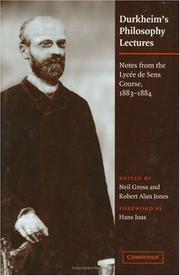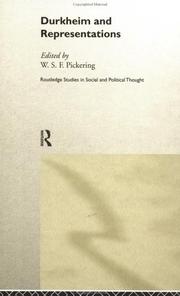| Listing 1 - 10 of 26 | << page >> |
Sort by
|

ISBN: 2858162565 2810708347 9782858162567 Year: 2019 Publisher: Toulouse : Presses universitaires du Midi,
Abstract | Keywords | Export | Availability | Bookmark
 Loading...
Loading...Choose an application
- Reference Manager
- EndNote
- RefWorks (Direct export to RefWorks)
Il y a exactement un siècle, Émile Durkheim publiait Les règles de la méthode sociologique. À l'encontre de ses contemporains, il cherchait à y définir le programme d'une discipline susceptible d'appliquer la méthode des sciences expérimentales à l'analyse des faits sociaux. Froidement accueilli, diversement apprécié, le livre de Durkheim est, dès sa parution, objet de commentaires et de controverses. Jean-Michel Berthelot s'attache à retrouver l'économie complexe d'un texte souvent méconnu, à restaurer et resituer le progamme d'analyse des faits sociaux qu'il propose. Il s'efforce de saisir, à travers les lectures successives et les appréciations diverses dont a été l'objet l'ouvrage, une image composite, instruisant tout autant sur les tourments d'une discipline en construction que sur la polysémie d'un texte fondateur.
Durkheim, Emile, --- Sociologie --- Méthodologie --- Sociology --- Durkheim, Émile, --- Durkheim, Émile, - 1858-1917. - Règles de la méthode sociologique --- sociologie --- réception --- analyse

ISBN: 0006860060 0006348971 9780006348979 9780006860068 Year: 1978 Publisher: Glasgow Fontana/Collins
Abstract | Keywords | Export | Availability | Bookmark
 Loading...
Loading...Choose an application
- Reference Manager
- EndNote
- RefWorks (Direct export to RefWorks)
Durkheim is generally considered to be the main founder of modern sociology. In France his ideas contributed to the rise of "structuralism", while in the English-speaking world he is regarded as the originator of "functionalism". This is comprehensive analysis of the development of his ideas.
Durkheim, Émile, --- Sociology --- Theories of Durkheim, Emile

ISBN: 1134715021 1280333367 0585451702 0203021908 9780585451701 9780203021903 9780415162869 0415162866 9781134714971 9781134715015 9781134715022 9781138007086 1138007080 9781280333361 Year: 1998 Volume: 10 Publisher: London New York Routledge
Abstract | Keywords | Export | Availability | Bookmark
 Loading...
Loading...Choose an application
- Reference Manager
- EndNote
- RefWorks (Direct export to RefWorks)
This is the first collection of essays to be published on Durkheim's masterpiece The elementary forms of religious life. It represents the work of the most important international Durkheim scholars from the fields of anthropology, philosophy and sociology. The essays focus on key topics including: the method Durkheim adopted in his study, the role of ritual and belief in society, and the nature of contemporary religion. The contributors also explore cutting-edge debates about the notion of the soul and collective rituals.
Religion. --- Totemism. --- Endogamy and exogamy --- Ethnology --- Mythology --- Religion --- Taboo --- Religion, Primitive --- Atheism --- Irreligion --- Religions --- Theology --- Durkheim, Émile, --- Totemism --- 291 --- 316.2 DURKHEIM, EMILE --- 316:2 --- 316.2 DURKHEIM, EMILE Sociologische richtingen. Sociologische scholen. Sociologen--DURKHEIM, EMILE --- Sociologische richtingen. Sociologische scholen. Sociologen--DURKHEIM, EMILE --- Godsdienstwetenschap: vergelijkend --- Godsdienstsociologie --- Durkheim, Emile, --- 316:2 Godsdienstsociologie --- Durkheim, Emile, - 1858-1917. - Formes élémentaires de la vie religieuse --- Emile Durkheim --- ethnography --- religion and science --- belief --- philosophy

ISBN: 1134626126 1134626118 1280069864 0585447470 020345927X 9780585447476 9780203459270 9781134626113 9781134626120 9786610069866 6610069867 9781134626076 113462607X 9781138007307 1138007307 9780415205825 0415205824 9781280069864 0203767519 9780203767511 Year: 2000 Publisher: London ; New York : Routledge,
Abstract | Keywords | Export | Availability | Bookmark
 Loading...
Loading...Choose an application
- Reference Manager
- EndNote
- RefWorks (Direct export to RefWorks)
Durkeim's book on suicide, first published in 1897, is widely regarded as a classic text, and is essential reading for any student of Durkheim's thought and sociological method. This book examines the continuing importance of Durkheim's methodology. The wide-ranging chapters cover such issues as the use of statistics, explanation of suicide, anomie and religion and the morality of suicide. It will be of vital interest to any serious scholar of Durkheim's thought and to the sociologist looking for a fresh methodological perspective.
Suicide. --- Killing oneself --- Self-killing --- Death --- Right to die --- Causes --- Durkheim, Émile, --- Durkheim, Emile,
Book
ISBN: 1786801965 1786801957 9781786801951 9781786801975 1786801973 9781786801968 0745337406 9780745337401 0745337414 9780745337418 0745337406 9780745337401 Year: 2017 Publisher: London Pluto Press
Abstract | Keywords | Export | Availability | Bookmark
 Loading...
Loading...Choose an application
- Reference Manager
- EndNote
- RefWorks (Direct export to RefWorks)
Sociology --- Social theory --- Social sciences --- Philosophy. --- Durkheim, Émile, --- Tʻu-erh-kan, --- Di︠u︡rkem, E., --- Durkheim, David Émile, --- Di︠u︡rkgeĭm, Ėmilʹ, --- Dyurukēmu, Emīru, --- Durkheim, Emilio, --- Criticism and interpretation. --- Dirkem, Emil, --- Philosophy --- Durkheim, Émile, --- Criticism and interpretation --- Sociology - France - Philosophy --- Durkheim, Émile, - 1858-1917 - Criticism and interpretation --- Durkheim, Émile, - 1858-1917 --- Durkheim, Emile

ISBN: 9780511499302 9780521630665 9780521175425 9780511211478 0511211473 0521630665 0511215053 9780511215056 051121684X 9780511216848 0511499302 1280541016 9781280541018 0511211473 0521630665 0521175429 1107142490 0511315538 0511213247 9781107142497 9780511315534 9780511213243 Year: 2004 Publisher: Cambridge, U.K. New York Cambridge University Press
Abstract | Keywords | Export | Availability | Bookmark
 Loading...
Loading...Choose an application
- Reference Manager
- EndNote
- RefWorks (Direct export to RefWorks)
Moving back and forth between the history of philosophy and the contributions of philosophers in his own day, Durkheim takes up topics as diverse as philosophical psychology, logic, ethics, and metaphysics, and seeks to articulate a unified philosophical position. Remarkably, in these lectures, given more than a decade before the publication of his groundbreaking book, The Division of Labour in Society (1893), the 'social realism' that is so characteristic of his later work - where he insists, famously, that social facts cannot be reduced to psychological or economic ones, and that such facts constrain human action in important ways - is totally absent in these early lectures. For this reason, they will be of special interest to students of the history of the social sciences, for they shed important light on the course of Durkheim's intellectual development.
Philosophy --- Social sciences --- #SBIB:052.AANKOOP --- #SBIB:316.20H32 --- 316.2 DURKHEIM, EMILE --- 316.2 DURKHEIM, EMILE Sociologische richtingen. Sociologische scholen. Sociologen--DURKHEIM, EMILE --- Sociologische richtingen. Sociologische scholen. Sociologen--DURKHEIM, EMILE --- Social philosophy --- Social theory --- Mental philosophy --- Humanities --- De sociologie van Emile Durkheim: secundaire bronnen --- Philosophy. --- Social Sciences --- Sociology

ISBN: 052165145X 0521112362 1107128307 0511170726 0511080662 0511297874 051148884X 1280417560 0511196202 0511079907 9780511080661 9780511488849 9780511297878 9780511079900 9781280417566 9780521651455 9780521112369 Year: 2004 Publisher: Cambridge Cambridge University Press
Abstract | Keywords | Export | Availability | Bookmark
 Loading...
Loading...Choose an application
- Reference Manager
- EndNote
- RefWorks (Direct export to RefWorks)
In this original and controversial book Professor Rawls argues that Durkheim's The Elementary Forms of Religious Life is the crowning achievement of his sociological endeavour and that since its publication in English in 1915 it has been consistently misunderstood. Rather than a work on primitive religion or the sociology of knowledge, Rawls asserts that it is an attempt by Durkheim to establish a unique epistemological basis for the study of sociology and moral relations. By privileging social practice over beliefs and ideas, it avoids the dilemmas inherent in philosophical approaches to knowledge and morality that are based on individualism and the tendency to privilege beliefs and ideas over practices, both tendencies that dominate western thought. Based on detailed textual analysis of the primary text, this book will be an important and original contribution to contemporary debates on social theory and philosophy.
Religion. --- Totemism. --- Religion --- Totémisme --- Durkheim, Emile, --- Totemism --- Totémisme --- Endogamy and exogamy --- Ethnology --- Mythology --- Taboo --- Religion, Primitive --- Atheism --- God --- Irreligion --- Religions --- Theology --- Durkheim, Émile, --- Social Sciences --- Sociology --- Durkheim, Emile, - 1858-1917. - Formes élémentaires de la vie religieuse

ISBN: 0803288034 0585336121 9780585336121 0803229070 9780803229075 9780803288034 Year: 1994 Publisher: Lincoln, Neb. University of Nebraska Press
Abstract | Keywords | Export | Availability | Bookmark
 Loading...
Loading...Choose an application
- Reference Manager
- EndNote
- RefWorks (Direct export to RefWorks)
The first book-length work to present a feminist analysis of the theoretical writings of Emile Durkheim, often viewed as the father of modern sociology.
Women --- Sociology --- Gender & Ethnic Studies --- Social Sciences --- Gender Studies & Sexuality --- Feminism --- Social conditions. --- History. --- Social conditions --- History --- Durkheim, Émile, --- Tʻu-erh-kan, --- Di︠u︡rkem, E., --- Durkheim, David Émile, --- Di︠u︡rkgeĭm, Ėmilʹ, --- Dyurukēmu, Emīru, --- Durkheim, Emilio, --- Views on women. --- Sociologie --- Femmes --- Histoire --- Conditions sociales --- Durkheim, Émile, --- Durkheim, Emile, --- Et les femmes --- Dirkem, Emil,

ISBN: 9780415190909 9780415757614 0415190908 0203004809 9780203004807 9781134655380 113465538X 9786610182350 6610182353 1280182350 9781134655335 9781134655373 1134655371 9781280182358 Year: 2014 Publisher: London Taylor & Francis
Abstract | Keywords | Export | Availability | Bookmark
 Loading...
Loading...Choose an application
- Reference Manager
- EndNote
- RefWorks (Direct export to RefWorks)
Durkheim's sociological thought is based on the premise that the world cannot be known as a thing in itself, but only through representations, rough approximations of the world created either individually or collectively. This set of papers by leading Durkheimians from Britain, America and continental Europe is the first concentrated attempt to understand what he meant by representations, how his understanding of the term was influenced by Kant and by neo-Kantians like Charles Renouvier and how his use of the concept in his work developed over time. By arguing that his use of representations a
Sociological theories --- Durkheim, Emile --- Sociology --- Representation (Philosophy) --- Representationalism (Philosophy) --- Representationism (Philosophy) --- Culture --- Philosophy --- Philosophy. --- Durkheim, Émile, --- Tʻu-erh-kan, --- Di︠u︡rkem, E., --- Durkheim, David Émile, --- Di︠u︡rkgeĭm, Ėmilʹ, --- Dyurukēmu, Emīru, --- Durkheim, Emilio, --- Dirkem, Emil, --- Durkheim, Emile,

ISBN: 0521650453 9780521650458 9780521022101 052102210X 9780511488818 1107116791 0511172273 0511150393 0511310145 0511488815 1280432497 0511052065 0511036833 9780511036835 9780511150395 0511007329 9780511007323 Year: 1999 Volume: 55 Publisher: Cambridge, U.K. New York Cambridge University Press
Abstract | Keywords | Export | Availability | Bookmark
 Loading...
Loading...Choose an application
- Reference Manager
- EndNote
- RefWorks (Direct export to RefWorks)
Drawing on the kind of historicist perspective encouraged by Quentin Skinner and Richard Rorty, this book explores the development of Durkheim's social realism. Durkheim argued that social facts should be studied as real, concrete things but Professor Jones argues that his social realism was less a sociological method than a way of speaking and thinking about social phenomena through which Durkheim hoped to secure the allegiance of French citizens to the Third Republic. Professor Jones's book, based on many years' research in this area, takes advantage for the first time of newly discovered lecture notes from Durkheim's philosophy class of 1883-4 and explores the significance of German social science in Durkheim's thought. The Development of Durkheim's Social Realism will be of immense value to graduate students and scholars in sociology, social theory, social and political philosophy and history of ideas.
Realism --- Realisme --- Realisme (Filosofie) --- Réalisme --- Réalisme (Philosophie) --- Sociology --- -Sociology --- -#SBIB:316.20H32 --- #SBIB:011.AANKOOP --- Social theory --- History --- Methodology --- De sociologie van Emile Durkheim: secundaire bronnen --- Durkheim, Emile --- Realism. --- Sociologie --- Réalisme --- History. --- Methodology. --- Histoire --- Méthodologie --- Durkheim, Emile, --- #SBIB:316.20H32 --- Empiricism --- Philosophy --- Universals (Philosophy) --- Conceptualism --- Dualism --- Idealism --- Materialism --- Nominalism --- Positivism --- Rationalism --- Tʻu-erh-kan, --- Di︠u︡rkem, E., --- Durkheim, David Émile, --- Di︠u︡rkgeĭm, Ėmilʹ, --- Dyurukēmu, Emīru, --- Durkheim, Emilio, --- -Empiricism --- Social sciences --- Durkheim, Émile. --- Durkheim, Émile, --- Dirkem, Emil, --- -Social theory --- Social Sciences --- Sociology - History --- Sociology - Methodology --- Durkheim, Émile, - 1858-1917 --- -History
| Listing 1 - 10 of 26 | << page >> |
Sort by
|

 Search
Search Feedback
Feedback About UniCat
About UniCat  Help
Help News
News